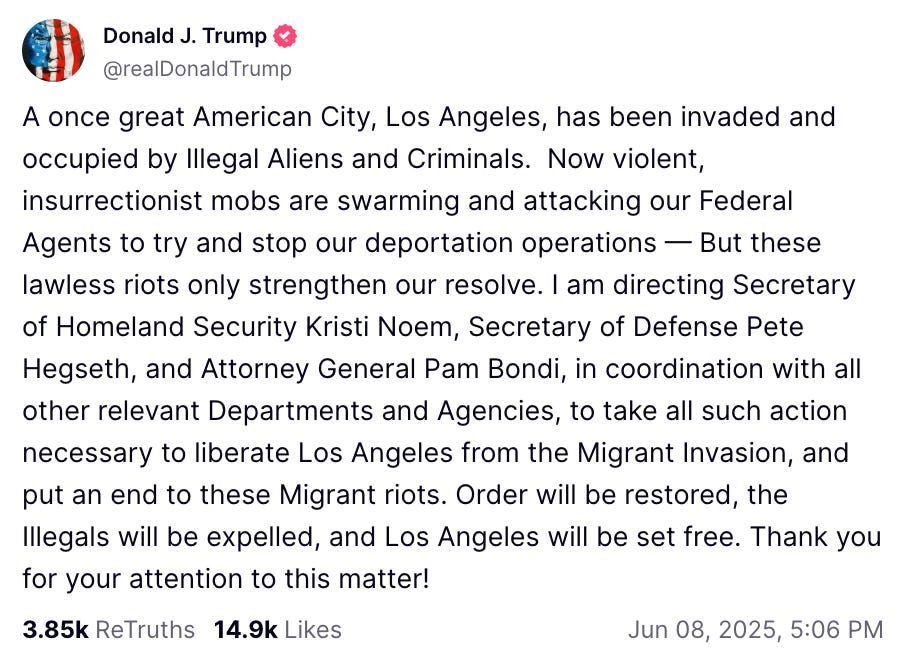Trump is spiraling. We face the consequences. Where are the other branches?
James Madison expected more from the other "departments," as he referred to them. And, for paid subscribers: Closing my tabs.
As President Donald Trump careens further and further into authoritarianism, congressional leadership veers from ambivalence to encouragement and the U.S. Supreme Court has only stepped in on a handful of rare occasions — primarily addressing the process (or lack thereof) employed by the administration, not the substance of its actions.
In the past five days alone, Trump announced efforts to implement an expansive travel ban — with 12 countries facing a near-blanket ban and another 7 facing significant restrictions — as well as an effort to ban student visas for Harvard and the activation of 2,000 members of the National Guard to “protect” U.S. Immigration and Customs Enforcement and other personnel carrying out the Trump administration’s immigration enforcement operation.
And while a federal judge has already blocked the Harvard effort, the Supreme Court’s conservatives are not particularly interested in playing a similar role when cases get up to them, as we saw just this Friday.
Further still, even the lower court rulings in the Harvard case merely follow Trump’s constantly-expanding efforts to attack the university for no reason other than the fact that it is pushing back.
That tracks, as one of Trump’s favorite methods of dealing with opposition is to attack.
We saw that “attack the opposition” effort rippling out throughout the administration with Friday’s Justice Department announcement that Kilmar Abrego Garcia had been indicted in Tennessee. The announcement came as Abrego Garcia was returned to the U.S. nearly three months after the Trump administration sent him to El Salvador in an “administrative error” and more than two months after a court ordered the government to “facilitate” his return.
The indictment was unsealed on June 6, but had been handed up and sealed on May 21. It came as many Democrats — and many Americans, period — had pushed back against the administration’s actions sending Abrego Garcia to El Salvador’s CECOT prison.
Around the time of the May 21 indictment, Ben Schrader, the head of the criminal division of the U.S. Attorney’s Office in Nashville, resigned after nearly 15 years. In announcing his departure on LinkedIn, Schrader wrote, “It has been an incredible privilege to serve as a prosecutor with the Department of Justice, where the only job description I've ever known is to do the right thing, in the right way, for the right reasons.” ABC News reported that sources said Schrader’s “abrupt” departure was because of the Abrego Garcia indictment, specifically Schrader’s “concerns that the case was being pursued for political reasons.“
That, though, wasn’t the headline on Friday.
One of Trump’s other favorite methods of addressing a perceived threat is to declare a problem and then over-respond to the problem he has invented, thus expanding the scale of the problem as part of his self-imagined creation.
That, of course, is the reason why Trump is pretending that the National Guard is needed in Los Angeles.
Say there’s a problem, create new rules or restrictions, and justify future escalations based on opposition to the new rules.
As I was drafting this, Trump went quite a ways to prove my point, with a particularly unhinged post:
Stepping back, it is important to remember that neither response — attacking the opposition nor manufacturing a crisis — is in any way unique to Trump. That said, Trump’s role as president and his regularly lawless means of acting to implement those responses does make his use of them particularly dangerous.
As imagined by the framers of our Constitution, however, that danger would have been offset by the other branches — jealously guarding their role in our government.
As Federalist 51, written by James Madison, put it, “[T]he great security against a gradual concentration of the several powers in the same department, consists in giving to those who administer each department the necessary constitutional means and personal motives to resist encroachments of the others.”
He continued:
[W]hat is government itself, but the greatest of all reflections on human nature? If men were angels, no government would be necessary. If angels were to govern men, neither external nor internal controls on government would be necessary. In framing a government which is to be administered by men over men, the great difficulty lies in this: you must first enable the government to control the governed; and in the next place oblige it to control itself.
And yet, here we are.
Closing my tabs
This Sunday, here are the tabs I am closing:




